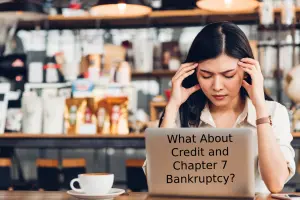What Happens to Credit Cards in Chapter 7 Bankruptcy?
Credit Cards Get Discharged In Bankruptcy.
You do not have to pay them
There are two types of debt. Secured debt, and unsecured debt. Secured debt means someone will take something from you if you don’t pay them. This is common in car loans and home loans. If you don’t pay the loan, someone takes your car or house. Unsecured debt means that there is no property to take if the loan is not repaid. This is common in payday loans and credit cards.
Credit cards are unsecured debt. Most unsecured debt gets discharged in Chapter 7 bankruptcy. This means you do not have to make any payments on them. You do not have to pay the credit cards at all.
Can I keep a Credit Card in Bankruptcy?
This question gets asked a lot. Do you have to put all of your credit cards “in” the bankruptcy? The Bankruptcy petition simply asks that you list all of your assets and all of your debts. If you do not owe money on a credit card, it is not a debt. Therefore, you do not have to list it on your bankruptcy petition. However, bankruptcy is a public record. If the bank or company issuing your credit card hears about your bankruptcy, they can still close your card. They can choose to do business with whomever they choose.
Should I Keep a Credit Card in Bankruptcy?
If you have a small balance on a car, it does not make sense to consider paying off the card so you do not have to list it in the bankruptcy. First, the issuing company might cancel the card anyway. Second, credit is not that hard to get after bankruptcy. And third, any bank will give you a secured card. This means that you give the bank any amount of money. They hold on to the money and give you a credit card with the same credit limit as the deposit you gave them. That way, if you don’t pay, they just take your deposit. After a few months, they give your deposit back, and you have a credit card. It is as easy as that.
What about Credit Unions in Chapter 7 Bankruptcy?
The Credit Union has been so nice. Can I still pay them?
Car salesmen are nice, too. They are just trying to sell you a car and make money. Customer service is valued so much by the banks because they make so much money off of you. They are not your friends. They pretend to be your friend so they can make money off of you. They are just like any other business.
Credit Unions are evil.
Credit unions are particularly deceptive. Credit unions have ways to take your money even banks don’t get to use. This is called cross-collateralization. Here is how it works. When the credit union is so super sweet to you that you agree to finance your car with them, they use the car as collateral. That is pretty standard. What the credit union does that even the banks do not do, is they tie any other money you owe them into the car loan. Therefore, all of their loans are secured. If you don’t pay their credit card, they will take your car. That is just not fair.
This cross-collateralization can hurt you in bankruptcy, too. In bankruptcy you have a right to keep your car.
What about Credit After Bankruptcy?
Does it really take ten years to get credit after bankruptcy? Not Even Close.
I filed bankruptcy right out of law school. I thought I would have to endure several years of not being approved for credit. Nothing could have been farther from the truth. I was able to buy a car the same month that I filed. Today, you can buy a car the same day you file, and the interest rates are about 10%. That is a better interest rate than some people have without a bankruptcy.
The general rule is that if you have three credit lines reporting current for 24 months (2 years) you will qualify for any loan. This will qualify you for a government backed loan. Unless you get rid of your debt, you will not be in a place to buy a home before that anyway.
Is bankruptcy better than foreclosure? Yes.
If you are in a position where you do not want, or cannot afford, your home anymore, file bankruptcy. If you let your home foreclose before filing bankruptcy, there are several bad things that will happen. First, there will be another public record document for your credit bureau to find. Negative public records are bad on your credit report. Second, it will increase the waiting period before buying another home. Sometimes, it takes up to seven years after a foreclosure to qualify for a new home loan. It only takes two years after a bankruptcy to qualify for a new home loan. Forfeit your home in bankruptcy, do not let it foreclose.
Is bankruptcy better than repossession? Yes.
You should forfeit your car in bankruptcy instead of forfeiting it to the bank, or getting it repossessed. This only makes sense. First, a repossession will report on your credit. Then you will have a repossession and a bankruptcy on your credit, instead of just a bankruptcy. Second, there are many options in bankruptcy that let you lower the interest rate on your car, or pay what the car is worth regardless of what you owe. If you want to keep your car, or do not want to go through the hassle of shopping for a new one, bankruptcy has many options. Third, you will get a much better interest rate on a new car if there is only bankruptcy, not repossession. Therefore, forfeit your car in bankruptcy instead of repossession.
Bankruptcy and credit go together. Bankruptcy is a great option, and it does not hurt your credit as much as you think.
Credit Repair Lawyers of America
Phone: 404-591-6680
Email: [email protected]
Website: https://creditrepairlawyersam.com/




